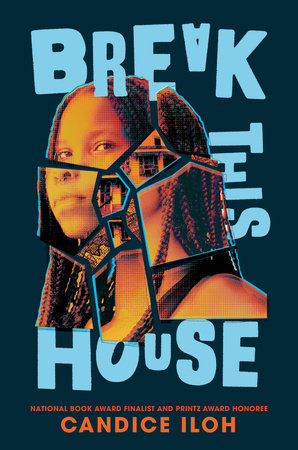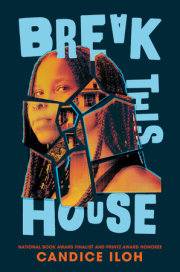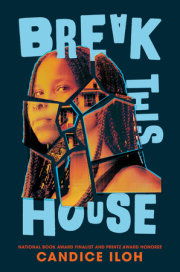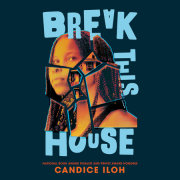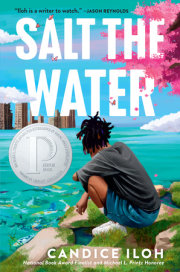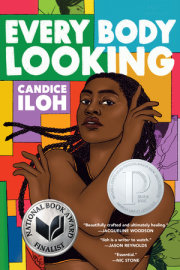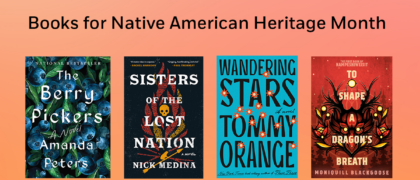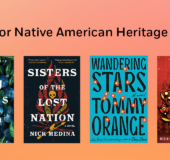ONE
“Aye, Pop. you stink.”
“Hello to you, too, Minah,” Pop says, cutting me off with an eye rollright before mushing a kiss into my forehead. I catch a whiff of stale cow blood before he continues past me into the kitchen. “Relax—-I’m on my way to the shower already. Ain’t gotta say that shit to me every day. Can’t expect your pop to quit his job just ’cause you protesting dead animals now.”
Everything about me that Pop and I disagree on he calls a “protest.” Us “new--grade young people”—-as he labels us—always gotta be hollerin’ about something that worked just fine back when he was a teenager, and the problem with us is that we got too many feelings about things that are simple, like food and the moon. According to Pop, we spend too much time fussing over everybody needing to be vegetarians when what we need to be doing is training our ears to be able to hear real music again.
“First of all, the shower’s that way. That’s the fridge, just in case you got a little confused. Second, ain’t nobody protesting. Just think they prolly should have showers in that death chamber you workin’ at, bro.” I don’t understand how a person can live with themselves after spending they whole day slaughtering everything that bleeds and then selling it to somebody on a foam plate and wrapped in plastic to take home to they families. I mean, it used to be nearly impossible for me to walk past Shake Shack without gettin’ got just last summer, but still. I’ve been delivered from my ignorance.
“All right, tell me something, bro,” he says, pulling off his pit--stained white tee, now turned a dingy yellow. “How could a place that pays forall of this,” he says, pausing to look around the house like it’s the second coming of the Trump Towers, “be adeath chamber?” He waits for the gulp of beer to slosh down his throat before flashing his “gotcha” smile. He wouldn’t be himself if he didn’t pause for dramatic effect when he’s tryna prove that he’s right.
“Now, you know ‘all of this’ don’t mean nothin’ in Crown Heights. We live in a box, Pop. And I’m pretty sure killing all god’s animal children every day and calling yourself a butcher classifies it as peak chamber of deaths. Like, by definition.” A vision of the Trump Towers flashes before my eyes in my imaginary Google search for American Chamber of Deaths before I shake it away to finish closing the deal. “But I’ll say a special prayer for your soul if I can get ten bucks.”
“You ain’t no real vegan,” he says, tossing me a sweaty, crumpled twenty from his jeans pocket. “I’ll believe that holistic mess you into now when you stop taking all my damn money. Shouldn’t your no--waste lifestyle be costing me less . . . or something like that? Get me two gallons of water and a bag of them plantain chips. The garlic kind.” Pop always gives me more than I ask for with a side of fake complaints. He puts on this act every time I ask for a little change to go to the store, but he’s always telling me that this is what he’s here for. And he’s always been here.
“Damn, Pop. Wasn’t tryna do all that. I was just tryna get something to drink.”
“ ‘Damn, Pop!’ ” His over--the--top impressions of me be having me weak. It doesn’t matter that my voice is almost as deep as his or that raising me ain’t like raising those other girls I go to school with. I always sound like a spoiled, whiny--ass chick who hangs out at the mall all day with Daddy’s credit card when Pop spits back the things I say at me. Full--on squeak mode.
“Firstly, watch your mouth. Nothing’s free, Minah. Plus, what you need a whole ten dollars for when you know all you ’bout to get is some orange juice and coconut water? Fancy--ass bodega--snacks tax?” he says, scrunching up his face in disgust at the latter. “You’re welcome.” He finally turns his back down the hall toward the bathroom.
“Breath gon’ be funkier than the homeless man on the train,” I mumble under my breath, pulling on a sneaker.
“What you say?!” he screams over the running bathwater as I pull on the other. I must got the youngest dad in the whole hood. He hears everything. The giant mirror leaned up against the wall just inside our front door gives me a chance to glance over my look. I reach for my biggest pair of sunglasses and pull a bucket hat low over my twists. A decent bodega--run disguise. I tug a little at each corner of my T--shirt and check out my ass in my favorite jeans. Loose enough.
“Nothing . . . nothing. I’ma be back.”
Our side of Crown Heights almost feels like don’t nobody go to work around here. Cars speed up and down the street like it ain’t kids around to worry about. Buses push off the stop even though they see somebody runnin’ to catch it. Dollar cabs blast horns loud enough you probably could hear them all the way in Bed-Stuy. Gossipy Trini grandmothers take their sweet time, clogging up the sidewalk in front of the West Indian market, squeezing mangoes and avocados checking to see if they’re ready to eat. And all of them scoot slow and unbothered with no signs of whether all the noise gets on their nerves. Each wrinkled hand remains steady despite how soca blasts from cars driving by behind them, shaking the whole block’s concrete.
“Yoooooo, mamaaaaaa. You got some extra change? Can you get me a soda?” I thought walking fast behind my biggest, blackest sunglasses, thumbing my phone like I got business, would have sent some type of signal to Old Man that I wasn’t tryna do all that today. He pauses, smiles with all his grayish ancient teeth, hands stuffed into his pockets. The no--need--to--be--scared--of--me stance I’m used to seeing on him, carefully chosen in hopes that I’ll let my guard down.
“You want a coffee?” I offer instead, continuing to walk. I don’t ever buy him soda. Or any of those other fake chemical excuses for food they got in there. Water, coffee, and sandwiches prepared on the grill only when I got it like that.
“I’ll take a coffee,” he accepts. The door jingles as I push quickly into the corner bodega. Old Man trails, head lowered, behind me. He makes a beeline for the coffee station while I split off down the aisle with all the chips. Fur grazes my ankle, and my instinct is to jump, but I fall back at ease looking down to see Bodega Cat greet me the way she always does. I try my best not to think about where she’s been or what she’s been doing with her life. Cats can’t take off their shoes after coming in from New York City streets like Pop makes me do, a never--ending reminder of how dirty this city is. And I don’t care that cats clean themselves all day with their own saliva. You can’t convince me licking yourself makes you clean. I grab Pop’s funky garlic chips—-the purple bag with the palm tree next to the bright green lettering—-right before heading to the back coolers for my juice and coconut water. Pop thinks he knows me or something. And how he gon’ send me in here for two whole jugs of water? Don’t none of these bodegas ever got grocery baskets. And don’t nobody ever come in here tryna buy enough to fill one. Most of this stuff’s usually stale anyway. I learned that the hard way last time I craved some Fruit Loops. Tragic.
“Is this crystalized . . . or granulated sugar? Or . . . or is it pure CANE sugar?” I hear Old Man asking Bobby at the register from the next aisle. My guy is homeless with rich millennial taste. Must have made his rounds in Williamsburg. One time he fussed at Bobby for putting American cheese instead of cheddar on a bacon, egg, and cheese that I’d bought him. “’Cause the CANE sugar is the good shit. That’s what I want in my coffee.” Bobby eyeballs Old Man as I come down the aisle, ignoring his question. “And wheeeeere is the hazelnut half--and--half? I likes my coffee CREAMY.”
I drop the juice, coconut water, and Pop’s chips and gallons on the counter. “I got this and his coffee.” Bobby mumbles something in Arabic as his eyes dart back and forth between the surveillance screen that hangs just above my head and Old Man, who’s thumbing the coffee counter for a lid, still talking to whomever he thinks is listening about hazelnut half--and--half. Bobby is never not looking like he’s worried and ready for somebody to steal something. Sometimes he barely even looks at me when I’m trying to hand him my money if somebody else is in there at the same time as me. But at least he don’t got somebody sitting right outside the bodega in a wooden box facing the door watching every customer that comes out like the dollar store across the street does. At least this one don’t got bulletproof glass we gotta speak into.
“All right, all right. Zas enough. Zas enough,” he calls out to Old Man now that he knows I’m paying. He adds the cost of everything up out loud. A small kid who looks just like him barely peeks over the counter and catches my eye from a stool he has perched just beyond the register. Behind his head is every kind of medicine, cigarette, or household appliance anyone could ever need. Options are stacked against the wall all the way to the ceiling. Pepto Bismol. Tylenol. Screwdrivers. Durags. Newports. Milk of Magnesia. Nasty. “Twelve dollars, baby. How you doing? No bacon and cheese? No cigarette?”
“I told you I don’t eat dead animals no more, Bobby. And I don’t even know what you talkin’ ’bout tryna sell me a loosie. I’m good,” I reply. I’m annoyed by his taunting smirk. Bobby asks me that almost every time I come in here like it ain’t been a whole year since I stopped eating meat. It’s annoying but at least he knows not to ask me about loosies in front of Pop. Don’t want him getting ideas. Grease snaps and sizzles loudly on the griddle filling the cramped storefront with hot pig smoke. I hand him the twenty and wait for him to count me back the change.
“Thank you, mama.” Old Man raises his coffee cup to me as if to toast to the only yes he’s heard all day and makes his way out with Bobby’s eyes glued on him until he’s fully out the door. I grab the bag of snacks and slide the gallons off the counter. I swear parents only have us so they can use us helpless kids for cheap labor.
The Memorial Day weekend heat and sunlight pushes into my face as I step out onto the sidewalk. At least five car speakers blast soca from different directions throughout the neighborhood as I watch a few motorcycles race down the orange fence–-lined street. The block is pressed for the careless vibes of summer life, with old ladies selling all kinds of mini flags representing every Caribbean country on the map. New fruit carts have popped up on the corner, jam--packed with sugar cane stalks at least six feet high for families to suck on once the wet heat turns the whole street into a West Indian block party. Dollar--cab horns alert people waiting on the bus that they got room to give us all a ride when the city fails us. Only two dollars for a ride up the street. Random police sirens enter the mix. Old Man is nowhere to be found.
Copyright © 2022 by Candice Iloh. All rights reserved. No part of this excerpt may be reproduced or reprinted without permission in writing from the publisher.

